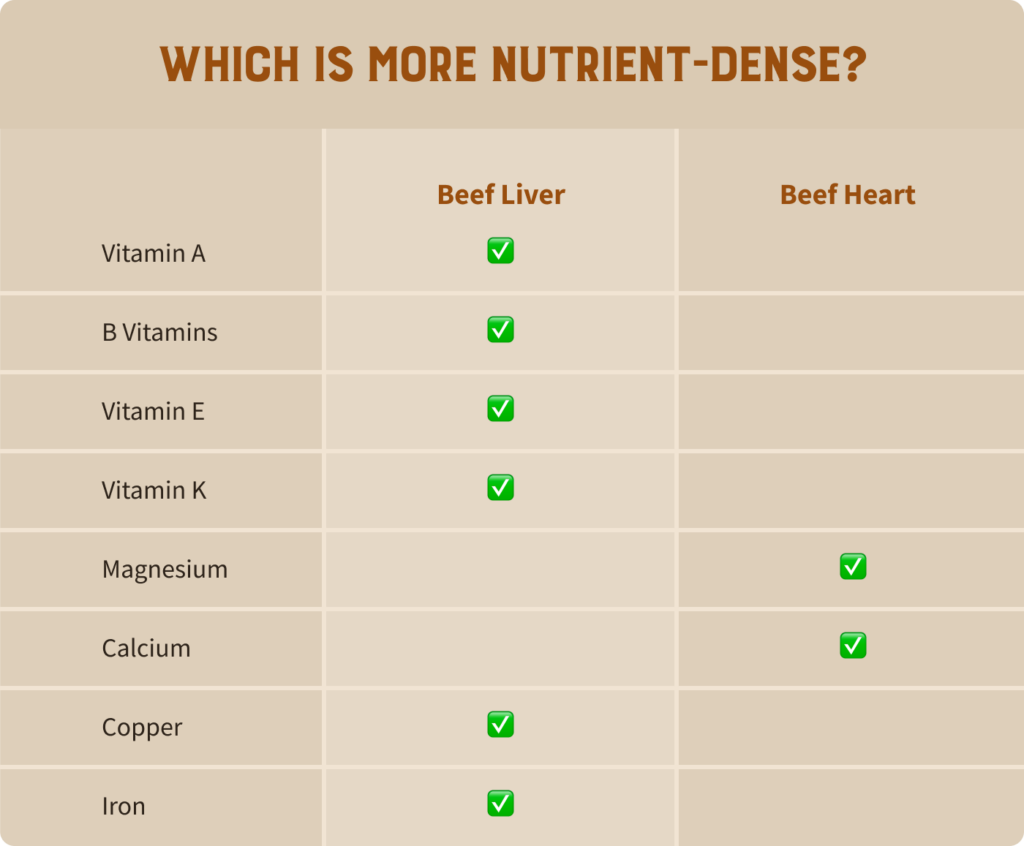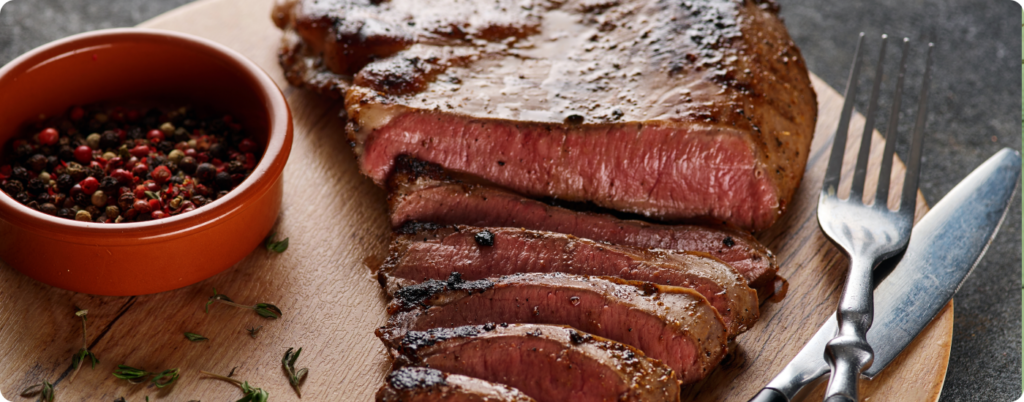PLEASE NOTE: The information in this blog is for educational purposes only. It is not a substitute for professional medical advice. Consult your healthcare provider if you’re seeking medical advice, diagnoses, or treatment.
There is a major push in the health world to discover the latest and greatest gadgets or diets for optimal health. Despite this effort, forgotten (or ignored) knowledge can often hold the answers that people are looking for.
A key forgotten pillar of health is the inclusion of organ meat in the diet. Organ meats have been a fixture in cuisines around the world for thousands of years, and animals throughout nature understand the immense value provided by organs.
One of the most prized organs is beef heart.
This article will explore beef heart nutrition facts, benefits, and the best ways to add this treasured organ to your diet.
Beef Heart Nutrition Facts: Why It’s So Powerful
Beef heart is jam-packed with nutrients.

Like other organ meats (sometimes called offal), beef heart is a bioavailable source of protein, vitamin A, B vitamins, vitamin E, and vitamin K2 (1). The USDA even classifies beef heart as an “excellent” source of riboflavin (vitamin B2), niacin (vitamin B3), and vitamin B12.
The following minerals are also plentiful in beef heart (2, 3):
- Iron
- Calcium
- Copper
- Manganese
- Selenium
- Magnesium
- Phosphorous
- Potassium
- Zinc
Compared to beef liver, beef heart is lower in protein and most vitamins and minerals but higher in fat, magnesium, and calcium (4).

Unsurprisingly, beef heart nutrition may lead to a host of health benefits.
8+ Benefits of Beef Heart: Energy, Exercise Performance, and More
Given its nutrient density, beef heart offers benefits throughout the body, potentially leading to improved energy exercise performance, along with better bone and muscle health.
1. B Vitamins
One of the main selling points of beef heart nutrition is its concentration of B vitamins. These essential vitamins each have unique health benefits (5, 6, 7, 8):
- Vitamin B1 is involved in the function, growth, and development of cells.
- Vitamin B2 plays an important role in cellular protection.
- Vitamin B3 can prevent premature aging, cardiovascular events, and arthritis.
- Vitamin B5 assists hormone synthesis and can help maintain healthy skin, hair, and nails.
- Vitamin B12 needs to be acquired through food and is crucial for cell division and the formation of DNA.
2. Improved Energy
Another benefit of Vitamin B5 plays is that it plas a role in energy production (9). Other components of beef heart such as creatine (popular for muscle growth), riboflavin, magnesium, and manganese are also involved in energy production (10).
3. Protection From Free Radicals
Free radicals are molecules that can lead to cellular damage and may be implicated in cancer and cardiovascular disease development (11). These free radicals can come from air pollution, smoke, and other environmental contaminants.
Beef heart offers key nutrients to fight back against free radicals:
- Vitamin B2 helps regenerative glutathione, a scavenger of free radicals (12).
- Vitamin E is an antioxidant that can protect cells from free radical damage (13).
- Minerals like selenium, iron, zinc, and manganese can also support enzymes that can reduce the impact of free radicals (14).
4. CoQ10
Coenzyme Q10 (CoQ10) is a compound that is found in every cell membrane in the human body (15). This nutrient can lead to better energy production, mitochondrial function, exercise performance, and also has antioxidant properties (16, 17, 18).
Compared to other organ meats, beef heart is a rich source of CoQ10 (19).
5. Bone & Muscle Health
When most people think of calcium, they think of dairy products, leafy greens, or supplements. But, beef heart is another source of calcium, a critical contributor to bone and teeth health (20).

Beef heart is an unlikely source of magnesium as well. Magnesium is needed for the creation and maintenance of bones and joints. Vitamin K2 is also found in beef heart, which can help with bone formation and may assist in the prevention of fractures related to osteoporosis (21).
6. Choline
Animal foods like eggs, dairy, and fish are key sources of choline as the body cannot produce enough on its own, and many people are not consuming enough of it (22). Although beef liver offers more, beef heart also provides choline.
The human body requires choline for neurotransmitters impacting muscle control, mood, memory, and other brain functions.
7. Nervous System Function

The nervous system is responsible for your memory, intelligence, digestion, breathing, and other important bodily functions (23).
Your nervous system may also benefit from the nutrients found in beef heart. In particular, choline, vitamin B3, vitamin B12, and manganese are important for nervous system function (24, 25, 26, 27).
8. Taste
Compared to other organ meats, beef hearts mild taste makes it one of the more popular options. If you’re new to organ meats and want to ease into it, eating beef heart is an amazing starting point.
How To Add Beef Heart To Your Diet
If you’re looking to incorporate beef heart into your diet, there are several simple strategies to consider.
Recipes

Cooking beef heart is not as popular in modern diets, but it’s a staple in traditional cuisines all over the world and can be found in a wide variety of dishes. Popular ways to cook beef heart include:
- Beef heart stew
- Grilled beef heart w/ chimichurri sauce
- Beef heart burgers
- Beef heart ragu
- Beef heart chili
Beef heart is also commonly used in raw pet food.
Organ Blends
Another popular method for adding organs to the diet is through blends. Companies such as Force of Nature offer an “ancestral blend” that consists of ground beef, beef liver, and beef heart.
With a mild taste, these blends can easily be used for burgers, meatballs, soups, and other recipes.
Supplements
If you’re not a fan of the taste but still want the benefits of beef heart nutrition, supplements like Warrior are a perfect alternative.

Made from 100% grass fed & grass-finished Heart & Liver, Warrior is a nutrient-dense tool for strength and recovery.
Rediscover the Benefits of Beef Heart
While not as nutritious as beef liver, the beef heart nutrition facts are still impressive. Beef heart is a high-quality source of key vitamins and minerals. Plus, beef heart is much more approachable than beef liver due to its mild taste.
As so many cultures around the world have, beef heart can be added to your diet in simple, delicious ways. In a modern environment that’s loaded with so many health issues and challenges, beef heart is a valuable ally to help you thrive and improve your overall health.
Subscribe to future articles like this: